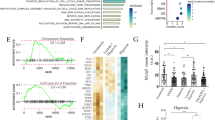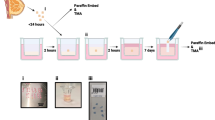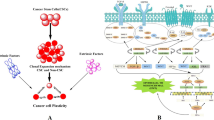Abstract
Tumor necrosis factor alpha (TNF-α), an abundant inflammatory cytokine in the tumor microenvironment (TME), is linked to breast cancer growth and metastasis. In this study, we established MCF10A cell lines incubated with TNF-α to investigate the effects of continuous TNF-α exposure on the phenotypic change of normal mammary epithelial cells. The established MCF10A-LE cell line, through long-term exposure to TNF-α, displayed cancer-like features, including increased proliferation, migration, and sustained survival signaling even in the absence of TNF-α stimulation. Unlike the short-term exposed cell line MCF10A-SE, MCF10A-LE exhibited elevated levels of epidermal growth factor receptor (EGFR) and subsequent TNF receptor 2 (TNFR2), and silencing of EGFR or TNFR2 suppressed the cancer-like phenotype of MCF10A-LE. Notably, we demonstrated that the elevated levels of NAD(P)H oxidase 4 (NOX4) and the resulting increase in reactive oxygen species (ROS) were associated with EGFR/TNFR2 elevation in MCF10A-LE. Furthermore, mammosphere-forming capacity and the expression of cancer stem cell (CSC) markers increased in MCF10A-LE. Silencing of EGFR reversed these effects, indicating the acquisition of CSC-like properties via EGFR signaling. In conclusion, our results reveal that continuous TNF-α exposure activates the EGFR/TNFR2 signaling pathway via the NOX4/ROS axis, promoting neoplastic changes in mammary epithelial cells within the inflammatory TME.






Similar content being viewed by others
References
Acharyya S, Oskarsson T, Vanharanta S, Malladi S, Kim J, Morris PG, Manova-Todorova K, Leversha M, Hogg N, Seshan VE, Norton L, Brogi E, Massagué J (2012) A CXCL1 paracrine network links cancer chemoresistance and metastasis. Cell 150(1):165–178. https://doi.org/10.1016/j.cell.2012.04.042
Aggarwal BB (2003) Signalling pathways of the TNF superfamily: a double-edged sword. Nat Rev Immunol 3(9):745–756. https://doi.org/10.1038/nri1184
Allen MD, Jones LJ (2015) The role of inflammation in progression of breast cancer: friend or foe? (Review). Int J Oncol 47(3):797–805. https://doi.org/10.3892/ijo.2015.3075
Asiedu MK, Ingle JN, Behrens MD, Radisky DC, Knutson KL (2011) TGFbeta/TNF(alpha)-mediated epithelial-mesenchymal transition generates breast cancer stem cells with a claudin-low phenotype. Can Res 71(13):4707–4719. https://doi.org/10.1158/0008-5472.CAN-10-4554
Bai J, Ding B, Li H (2022) Targeting TNFR2 in cancer: all roads lead to rome. Front Immunol 13:844931. https://doi.org/10.3389/fimmu.2022.844931
Baird A-M, Gray SG, Richard DJ, O’Byrne KJ (2016) Promotion of a cancer-like phenotype, through chronic exposure to inflammatory cytokines and hypoxia in a bronchial epithelial cell line model. Sci Rep 6(1):18907. https://doi.org/10.1038/srep18907
Balkwill F (2009) Tumour necrosis factor and cancer. Nat Rev Cancer 9(5):361–371. https://doi.org/10.1038/nrc2628
Bertrand F, Montfort A, Marcheteau E, Imbert C, Gilhodes J, Filleron T, Rochaix P, Andrieu-Abadie N, Levade T, Meyer N, Colacios C, Ségui B (2017) TNFα blockade overcomes resistance to anti-PD-1 in experimental melanoma. Nat Commun 8(1):2256. https://doi.org/10.1038/s41467-017-02358-7
Blick M, Sherwin SA, Rosenblum M, Gutterman J (1987) Phase I study of recombinant tumor necrosis factor in cancer patients. Can Res 47(11):2986–2989
Carswell EA, Old LJ, Kassel RL, Green S, Fiore N, Williamson B (1975) An endotoxin-induced serum factor that causes necrosis of tumors. Proc Natl Acad Sci USA 72(9):3666–3670. https://doi.org/10.1073/pnas.72.9.3666
Cerami E, Gao J, Dogrusoz U, Gross BE, Sumer SO, Aksoy BA, Jacobsen A, Byrne CJ, Heuer ML, Larsson E, Antipin Y, Reva B, Goldberg AP, Sander C, Schultz N (2012) The cBio cancer genomics portal: an open platform for exploring multidimensional cancer genomics data. Cancer Discov 2(5):401–404. https://doi.org/10.1158/2159-8290.CD-12-0095
Chan YH (2003) Biostatistics 104: correlational analysis. Singapore Med J 44(12):614–619
Chen WN, Woodbury RL, Kathmann LE, Opresko LK, Zangar RC, Wiley HS, Thrall BD (2004) Induced autocrine signaling through the epidermal growth factor receptor contributes to the response of mammary epithelial cells to tumor necrosis factor alpha. J Biol Chem 279(18):18488–18496. https://doi.org/10.1074/jbc.M310874200
Creagan ET, Kovach JS, Moertel CG, Frytak S, Kvols LK (1988) A phase I clinical trial of recombinant human tumor necrosis factor. Cancer 62(12):2467–2471. https://doi.org/10.1002/1097-0142(19881215)62:12%3c2467::aid-cncr2820621202%3e3.0.co;2-5
Cruceriu D, Baldasici O, Balacescu O, Berindan-Neagoe I (2020) The dual role of tumor necrosis factor-alpha (TNF-alpha) in breast cancer: molecular insights and therapeutic approaches. Cell Oncol (dordr) 43(1):1–18. https://doi.org/10.1007/s13402-019-00489-1
Debnath J, Mills KR, Collins NL, Reginato MJ, Muthuswamy SK, Brugge JS (2002) The role of apoptosis in creating and maintaining luminal space within normal and oncogene-expressing mammary acini. Cell 111(1):29–40. https://doi.org/10.1016/s0092-8674(02)01001-2
Gao J, Aksoy Bülent A, Dogrusoz U, Dresdner G, Gross B, Sumer SO, Sun Y, Jacobsen A, Sinha R, Larsson E, Cerami E, Sander C, Schultz N (2013) Integrative analysis of complex cancer genomics and clinical profiles using the cBioPortal. Sci Signal 6(269):pl1. https://doi.org/10.1126/scisignal.2004088
Greer YE, Gilbert SF, Gril B, Narwal R, Peacock Brooks DL, Tice DA, Steeg PS, Lipkowitz S (2019) MEDI3039, a novel highly potent tumor necrosis factor (TNF)-related apoptosis-inducing ligand (TRAIL) receptor 2 agonist, causes regression of orthotopic tumors and inhibits outgrowth of metastatic triple-negative breast cancer. Breast Cancer Res 21(1):27. https://doi.org/10.1186/s13058-019-1116-1
Grivennikov SI, Greten FR, Karin M (2010) Immunity, inflammation, and cancer. Cell 140(6):883–899. https://doi.org/10.1016/j.cell.2010.01.025
Hamilton KE, Simmons JG, Ding S, Van Landeghem L, Lund PK (2011) Cytokine induction of tumor necrosis factor receptor 2 is mediated by STAT3 in colon cancer cells. Mol Cancer Res 9(12):1718–1731. https://doi.org/10.1158/1541-7786.MCR-10-0210
Hanahan D, Weinberg RA (2011) Hallmarks of cancer: the next generation. Cell 144(5):646–674. https://doi.org/10.1016/j.cell.2011.02.013
Ho MY, Tang SJ, Chuang MJ, Cha TL, Li JY, Sun GH, Sun KH (2012) TNF-alpha induces epithelial-mesenchymal transition of renal cell carcinoma cells via a GSK3beta-dependent mechanism. Mol Cancer Res 10(8):1109–1119. https://doi.org/10.1158/1541-7786.MCR-12-0160
Kim ES, Shin Y, Kim EH, Kim D, De Felice M, Majid A, Bae ON (2022) Neuroprotective efficacy of N-t-butylhydroxylamine (NtBHA) in transient focal ischemia in rats. Toxicol Res 38(4):479–486. https://doi.org/10.1007/s43188-022-00131-7
Kishimoto T, Taga T, Akira S (1994) Cytokine signal transduction. Cell 76(2):253–262. https://doi.org/10.1016/0092-8674(94)90333-6
Kriegler M, Perez C, DeFay K, Albert I, Lu SD (1988) A novel form of TNF/cachectin is a cell surface cytotoxic transmembrane protein: ramifications for the complex physiology of TNF. Cell 53(1):45–53. https://doi.org/10.1016/0092-8674(88)90486-2
Lee SH, Hong HS, Liu ZX, Kim RH, Kang MK, Park NH, Shin KH (2012) TNFalpha enhances cancer stem cell-like phenotype via Notch-Hes1 activation in oral squamous cell carcinoma cells. Biochem Biophys Res Commun 424(1):58–64. https://doi.org/10.1016/j.bbrc.2012.06.065
Li CW, Xia W, Huo L, Lim SO, Wu Y, Hsu JL, Chao CH, Yamaguchi H, Yang NK, Ding Q, Wang Y, Lai YJ, LaBaff AM, Wu TJ, Lin BR, Yang MH, Hortobagyi GN, Hung MC (2012) Epithelial-mesenchymal transition induced by TNF-alpha requires NF-kappaB-mediated transcriptional upregulation of Twist1. Can Res 72(5):1290–1300. https://doi.org/10.1158/0008-5472.CAN-11-3123
Liu D, Wang X, Chen Z (2016) Tumor necrosis factor-α, a regulator and therapeutic agent on breast cancer. Curr Pharm Biotechnol 17(6):486–494. https://doi.org/10.2174/1389201017666160301102713
Liu W, Lu X, Shi P, Yang G, Zhou Z, Li W, Mao X, Jiang D, Chen C (2020) TNF-alpha increases breast cancer stem-like cells through up-regulating TAZ expression via the non-canonical NF-kappaB pathway. Sci Rep 10(1):1804. https://doi.org/10.1038/s41598-020-58642-y
Liubomirski Y, Lerrer S, Meshel T, Rubinstein-Achiasaf L, Morein D, Wiemann S, Korner C, Ben-Baruch A (2019) Tumor-stroma-inflammation networks promote pro-metastatic chemokines and aggressiveness characteristics in triple-negative breast cancer. Front Immunol 10:757. https://doi.org/10.3389/fimmu.2019.00757
Ma Y, Ren Y, Dai ZJ, Wu CJ, Ji YH, Xu J (2017) IL-6, IL-8 and TNF-alpha levels correlate with disease stage in breast cancer patients. Adv Clin Exp Med 26(3):421–426. https://doi.org/10.17219/acem/62120
Manea A, Manea SA, Gafencu AV, Raicu M, Simionescu M (2008) AP-1–dependent transcriptional regulation of NADPH oxidase in human aortic smooth muscle cells. Arterioscler Thromb Vasc Biol 28(5):878–885. https://doi.org/10.1161/ATVBAHA.108.163592
Maolake A, Izumi K, Natsagdorj A, Iwamoto H, Kadomoto S, Makino T, Naito R, Shigehara K, Kadono Y, Hiratsuka K, Wufuer G, Nastiuk KL, Mizokami A (2018) Tumor necrosis factor-alpha induces prostate cancer cell migration in lymphatic metastasis through CCR7 upregulation. Cancer Sci 109(5):1524–1531. https://doi.org/10.1111/cas.13586
Miles DW, Happerfield LC, Naylor MS, Bobrow LG, Rubens RD, Balkwill FR (1994) Expression of tumour necrosis factor (TNF alpha) and its receptors in benign and malignant breast tissue. Int J Cancer 56(6):777–782. https://doi.org/10.1002/ijc.2910560603
Mir S, Golden BDO, Griess BJ, Vengoji R, Tom E, Kosmacek EA, Oberley-Deegan RE, Talmon GA, Band V, Teoh-Fitzgerald MLT (2022) Upregulation of Nox4 induces a pro-survival Nrf2 response in cancer-associated fibroblasts that promotes tumorigenesis and metastasis, in part via Birc5 induction. Breast Cancer Res 24(1):48. https://doi.org/10.1186/s13058-022-01548-6
Miranowicz-Dzierżawska K, Zapór L, Skowroń J, Chojnacka-Puchta L, Sawicka D (2023) The effects of co-exposure to methyl paraben and dibutyl phthalate on cell line derived from human skin. Toxicological Research 39(1):71–89. https://doi.org/10.1007/s43188-022-00151-3
Moatti A, Cohen JL (2021) The TNF-α/TNFR2 pathway: targeting a brake to release the anti-tumor immune response. Front Cell Dev Biol 9:725473. https://doi.org/10.3389/fcell.2021.725473
Paul K., Paik Jia, Luo Ni, Ai Rachel, Kim Linda, Ahn Anup, Biswas Courtney, Coker Wanchao, Ma Phillip, Wong Darren J., Buonocore W. Victoria, Lai Jamie E., Chaft Swarnali, Acharyya Joan, Massagué Mark G., Kris (2022) Phase I trial of the TNF-α inhibitor certolizumab plus chemotherapy in stage IV lung adenocarcinomas Abstract Nature Communications 13(1) https://doi.org/10.1038/s41467-022-33719-6
Perez-Ruiz E, Minute L, Otano I, Alvarez M, Ochoa MC, Belsue V, de Andrea C, Rodriguez-Ruiz ME, Perez-Gracia JL, Marquez-Rodas I, Llacer C, Alvarez M, de Luque V, Molina C, Teijeira A, Berraondo P, Melero I (2019) Prophylactic TNF blockade uncouples efficacy and toxicity in dual CTLA-4 and PD-1 immunotherapy. Nature 569(7756):428–432. https://doi.org/10.1038/s41586-019-1162-y
Purdue MP, Johansson M, Zelenika D, Toro JR, Scelo G, Moore LE, Prokhortchouk E, Wu X, Kiemeney LA, Gaborieau V, Jacobs KB, Chow W-H, Zaridze D, Matveev V, Lubinski J, Trubicka J, Szeszenia-Dabrowska N, Lissowska J, Rudnai P, Fabianova E, Bucur A, Bencko V, Foretova L, Janout V, Boffetta P, Colt JS, Davis FG, Schwartz KL, Banks RE, Selby PJ, Harnden P, Berg CD, Hsing AW, Grubb RL, Boeing H, Vineis P, Clavel-Chapelon F, Palli D, Tumino R, Krogh V, Panico S, Duell EJ, Quirós JR, Sanchez M-J, Navarro C, Ardanaz E, Dorronsoro M, Khaw K-T, Allen NE, Bueno-de-Mesquita HB, Peeters PHM, Trichopoulos D, Linseisen J, Ljungberg B, Overvad K, Tjønneland A, Romieu I, Riboli E, Mukeria A, Shangina O, Stevens VL, Thun MJ, Diver WR, Gapstur SM, Pharoah PD, Easton DF, Albanes D, Weinstein SJ, Virtamo J, Vatten L, Hveem K, Njølstad I, Tell GS, Stoltenberg C, Kumar R, Koppova K, Cussenot O, Benhamou S, Oosterwijk E, Vermeulen SH, Aben KKH, van der Marel SL, Ye Y, Wood CG, Pu X, Mazur AM, Boulygina ES, Chekanov NN, Foglio M, Lechner D, Gut I, Heath S, Blanche H, Hutchinson A, Thomas G, Wang Z, Yeager M, Fraumeni JF, Skryabin KG, McKay JD, Rothman N, Chanock SJ, Lathrop M, Brennan P (2011) Genome-wide association study of renal cell carcinoma identifies two susceptibility loci on 2p21 and 11q13.3. Nat Genetics 43(1):60–65. https://doi.org/10.1038/ng.723
Rahman M, Pumphrey JG, Lipkowitz S (2009) The TRAIL to targeted therapy of breast cancer. Adv Cancer Res 103:43–73. https://doi.org/10.1016/S0065-230X(09)03003-6
Ryoo IG, Choi BH, Kwak MK (2015) Activation of NRF2 by p62 and proteasome reduction in sphere-forming breast carcinoma cells. Oncotarget 6(10):8167–8184. https://doi.org/10.18632/oncotarget.3047
Ryu D, Lee JH, Kwak MK (2020) NRF2 level is negatively correlated with TGF-β1-induced lung cancer motility and migration via NOX4-ROS signaling. Arch Pharmacal Res 43(12):1297–1310. https://doi.org/10.1007/s12272-020-01298-z
Salomon BL (2021) Insights into the biology and therapeutic implications of TNF and regulatory T cells. Nat Rev Rheumatol 17(8):487–504. https://doi.org/10.1038/s41584-021-00639-6
Schmiegel W, Roeder C, Schmielau J, Rodeck U, Kalthoff H (1993) Tumor necrosis factor alpha induces the expression of transforming growth factor alpha and the epidermal growth factor receptor in human pancreatic cancer cells. Proc Natl Acad Sci USA 90(3):863–867. https://doi.org/10.1073/pnas.90.3.863
Sethi G, Sung B, Aggarwal BB (2008) TNF: a master switch for inflammation to cancer. Front Biosci 13:5094–5107. https://doi.org/10.2741/3066
Soria G, Ofri-Shahak M, Haas I, Yaal-Hahoshen N, Leider-Trejo L, Leibovich-Rivkin T, Weitzenfeld P, Meshel T, Shabtai E, Gutman M, Ben-Baruch A (2011) Inflammatory mediators in breast cancer: coordinated expression of TNFα & IL-1β with CCL2 & CCL5 and effects on epithelial-to-mesenchymal transition. BMC Cancer 11:130. https://doi.org/10.1186/1471-2407-11-130
Soule HD, Maloney TM, Wolman SR, Peterson WD Jr, Brenz R, McGrath CM, Russo J, Pauley RJ, Jones RF, Brooks SC (1990) Isolation and characterization of a spontaneously immortalized human breast epithelial cell line, MCF-10. Can Res 50(18):6075–6086
Stathopoulos GT, Kollintza A, Moschos C, Psallidas I, Sherrill TP, Pitsinos EN, Vassiliou S, Karatza M, Papiris SA, Graf D, Orphanidou D, Light RW, Roussos C, Blackwell TS, Kalomenidis I (2007) Tumor necrosis factor-alpha promotes malignant pleural effusion. Can Res 67(20):9825–9834. https://doi.org/10.1158/0008-5472.Can-07-1064
Storci G, Sansone P, Mari S, D’Uva G, Tavolari S, Guarnieri T, Taffurelli M, Ceccarelli C, Santini D, Chieco P, Marcu KB, Bonafe M (2010) TNFalpha up-regulates SLUG via the NF-kappaB/HIF1alpha axis, which imparts breast cancer cells with a stem cell-like phenotype. J Cell Physiol 225(3):682–691. https://doi.org/10.1002/jcp.22264
Sugarman BJ, Aggarwal BB, Hass PE, Figari IS, Palladino MA Jr, Shepard HM (1985) Recombinant human tumor necrosis factor-alpha: effects on proliferation of normal and transformed cells in vitro. Science 230(4728):943–945. https://doi.org/10.1126/science.3933111
Talukdar S, Emdad L, Das SK, Fisher PB (2020) EGFR: An essential receptor tyrosine kinase-regulator of cancer stem cells. Adv Cancer Res 147:161–188. https://doi.org/10.1016/bs.acr.2020.04.003
Ungewickell A, Bhaduri A, Rios E, Reuter J, Lee CS, Mah A, Zehnder A, Ohgami R, Kulkarni S, Armstrong R, Weng WK, Gratzinger D, Tavallaee M, Rook A, Snyder M, Kim Y, Khavari PA (2015) Genomic analysis of mycosis fungoides and Sézary syndrome identifies recurrent alterations in TNFR2. Nat Genet 47(9):1056–1060. https://doi.org/10.1038/ng.3370
Wajant H, Scheurich P (2011) TNFR1-induced activation of the classical NF-kappaB pathway. FEBS J 278(6):862–876. https://doi.org/10.1111/j.1742-4658.2011.08015.x
Wallach D, Varfolomeev EE, Malinin NL, Goltsev YV, Kovalenko AV, Boldin MP (1999) Tumor necrosis factor receptor and Fas signaling mechanisms. Annu Rev Immunol 17:331–367. https://doi.org/10.1146/annurev.immunol.17.1.331
Wang H, Wang HS, Zhou BH, Li CL, Zhang F, Wang XF, Zhang G, Bu XZ, Cai SH, Du J (2013) Epithelial-mesenchymal transition (EMT) induced by TNF-alpha requires AKT/GSK-3beta-mediated stabilization of snail in colorectal cancer. PLoS ONE 8(2):e56664. https://doi.org/10.1371/journal.pone.0056664
Wang G, Li Y, Yang Z, Xu W, Yang Y, Tan X (2018) ROS mediated EGFR/MEK/ERK/HIF-1α loop regulates glucose metabolism in pancreatic cancer. Biochem Biophys Res Commun 500(4):873–878. https://doi.org/10.1016/j.bbrc.2018.04.177
Wang J, Li D, Cang H, Guo B (2019) Crosstalk between cancer and immune cells: role of tumor-associated macrophages in the tumor microenvironment. Cancer Med 8(10):4709–4721. https://doi.org/10.1002/cam4.2327
Weng MS, Chang JH, Hung WY, Yang YC, Chien MH (2018) The interplay of reactive oxygen species and the epidermal growth factor receptor in tumor progression and drug resistance. J Exp Clin Cancer Res 37(1):61. https://doi.org/10.1186/s13046-018-0728-0
Yang F, Zhao Z, Zhao N (2017) Clinical implications of tumor necrosis factor receptor 2 in breast cancer. Oncol Lett 14(2):2393–2398. https://doi.org/10.3892/ol.2017.6410
Yang Y, Islam MS, Hu Y, Chen X (2021) TNFR2: role in Cancer Immunology and Immunotherapy. Immunotargets Ther 10:103–122. https://doi.org/10.2147/ITT.S255224
Yi L, Shen H, Zhao M, Shao P, Liu C, Cui J, Wang J, Wang C, Guo N, Kang L, Lv P, Xing L, Zhang X (2017) Inflammation-mediated SOD-2 upregulation contributes to epithelial-mesenchymal transition and migration of tumor cells in aflatoxin G1-induced lung adenocarcinoma. Sci Rep 7(1):7953. https://doi.org/10.1038/s41598-017-08537-2
Zhao T, Li H, Liu Z (2017) Tumor necrosis factor receptor 2 promotes growth of colorectal cancer via the PI3K/AKT signaling pathway. Oncol Lett 13(1):342–346. https://doi.org/10.3892/ol.2016.5403
Zins K, Abraham D, Sioud M, Aharinejad S (2007) Colon cancer cell-derived tumor necrosis factor-alpha mediates the tumor growth-promoting response in macrophages by up-regulating the colony-stimulating factor-1 pathway. Can Res 67(3):1038–1045. https://doi.org/10.1158/0008-5472.Can-06-2295
Funding
This work was supported by National Research Foundation of Korea (NRF) grants funded by the Korean government (MSIT) (2018R1A2A1A05078894, 2020R1I1A1A01074375, 2022R1A2C2011866, and 2018R1A6A1A03025108).
Author information
Authors and Affiliations
Corresponding author
Ethics declarations
Conflict of interest
The authors declare that they have no conflicts of interest.
Additional information
Publisher's Note
Springer Nature remains neutral with regard to jurisdictional claims in published maps and institutional affiliations.
Supplementary Information
Below is the link to the electronic supplementary material.
Rights and permissions
Springer Nature or its licensor (e.g. a society or other partner) holds exclusive rights to this article under a publishing agreement with the author(s) or other rightsholder(s); author self-archiving of the accepted manuscript version of this article is solely governed by the terms of such publishing agreement and applicable law.
About this article
Cite this article
Lee, JH., Hallis, S.P. & Kwak, MK. Continuous TNF-α exposure in mammary epithelial cells promotes cancer phenotype acquisition via EGFR/TNFR2 activation. Arch. Pharm. Res. (2024). https://doi.org/10.1007/s12272-024-01497-y
Received:
Accepted:
Published:
DOI: https://doi.org/10.1007/s12272-024-01497-y




